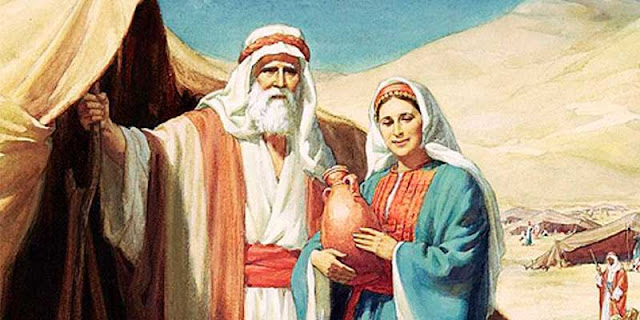The Life/Death of Sarah
Sarah lived to be a hundred and
twenty-seven years old. She died at Kiriath Arba (that is, Hebron) in the land
of Canaan, and Abraham went to mourn for Sarah and to weep over her.
Then Abraham rose from beside his dead wife and
spoke to the Hittites. He said, “I am a foreigner and stranger among you. Sell
me some property for a burial site here so I can bury my dead.”
The Hittites replied to Abraham, “Sir, listen to
us. You are a mighty prince among us. Bury your dead in the choicest of our
tombs. None of us will refuse you his tomb for burying your dead.”
Then Abraham rose and bowed down before the
people of the land, the Hittites. He said to them, “If you are willing to let
me bury my dead, then listen to me and intercede with Ephron son of Zohar on my
behalf 9so he will sell me the cave of Machpelah, which belongs to him and is
at the end of his field. Ask him to sell it to me for the full price as a
burial site among you.” Genesis 23:1-9 NIV
Until now, Abraham and his clan wandered the
promised land and in their hands, they had only a promise. No written contracts,
no acquisitions. And then the drama unfolds - Isaacs Binding (Chapter 22 of
Genesis), naturally, this event gives rise to tragedy. Ordinary domestic
tragedy. The mother's heart cannot stand the expectation, and she, in search of
her son and husband, having reached Hebron, dies. At least that’s according to
the rabbinical commentary. Her death gives Abraham a reason to enter a formal
contract to purchase property in the promised land. Since then, many centuries
have passed, and the Promised Land, that is, Israel, has become not only a
“promise”, but a reality - the land that belongs to the children of Abraham,
the Jewish people, to us.
Death gives birth to life, no matter how
terrifying it may sound. Death brings reward. But this applies only to the
death of the Righteous. “Precious in the sight of the Lord is the death of his
faithful servants.” (Psalms 116:15 NIV) And we also read the words of the Lord:
“Very truly I tell you, unless a kernel of wheat falls to the ground and dies,
it remains only a single seed. But if it dies, it produces many seeds.” (John
12:24 NIV) – this is a common truth, although it is very difficult for us to understand.
And it was difficult for the disciples of Yeshua to accept this truth since it
was a direct allusion/prophecy about His death… But all this was laid as a
principle from ancient times. The idea of death/redemption was clear to
Adam, who received the word - for sin "to death" - that is, you will
pay for your sin.
It is in this format that it is so important to
realize that no sacrifice goes unnoticed, and the result, a good result, and
the fruit of sacrifice, will bless many generations.
This is also the basis of a great promise, so
little described in the Tanakh, but already described from ancient times in the
prayer practice of Israel, and later by the disciples of Yeshua, who conveyed
and approved this Idea in the promises of the New Testament - the Resurrection
of the dead/good gmul /retribution. In the prayer of Amid, the words "God
is faithful to raise the dead" are repeated dozens of times. Prayer Iskor
- God who gave you life and allowed you to die, having grown old, RESURRECTS
you on the day of One! The New Testament encourages us - do not grieve beyond
measure, He will resurrect everyone!
Scripture connects these two points - sacrifice and
resurrection, the desire to do good, to act according to the will of God. This
is what defines us in our coming resurrection - glory or disgrace, "a
brand of fire" or Good retribution from the Heavenly Father. Let's
continue to live, looking at Heaven!
Sincerely, Leon Mazin
You can support or learn more about our mission here: www.shaveitzion.org










Comments
Post a Comment